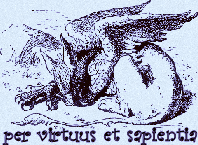Go to the seaside. I have heard it in a song, and now it is my call, a cry for the voiceless gull. Go to the sea, and see the white midden slopes of oyster shells and the black vultures above. The harbor is swirling in the wake of the seals, the smell of fish and seaweed, and the whale-topped weather vane is turning to the north, the grinning wooden whale gazing to the north.
You should be here, with a thousand footprints in the sand behind you. You should see the sand fleas jump in the lines of green algae and fossil shells. For today the sky has turned upside down, and today the clouds touch the water, the blue sky hidden far above. There is sunshine there, and warmth, but here on the bay only clouds. The fog is pressing, and the waves are pressing, and the limestone cliffs tilt a little further, showering their fossils into sand crossed by footprints.
The children of the bridge are laughing, they are looking over, they are driven to the sides by the traffic, the people of the bridge. They walk on the edges. The egrets below are probing deep mud, are standing silent, the gulls flying around them, and the dust rises from the road. Gulls are there too, lying dead on the side of the road, and the traffic drives on. We are all pressing on, we are pushing on, we cars and gulls and clouds of dust, past the marshlands and the flatlands, the saltflats and the saltwater sedges, with the sand dunes rising alongside them, the fossil sand dunes, rising to the ocean. We are pressing northward, we travellers, we pilgrims of the coastline, north from the grinning whale. To our left are the ports and the oysterbeds and the shell shops. To the right the inland rivers that reach out to touch salt, the fingers of cities and civilization. We do not go to the right. Straight ahead are the forests and the ghosts of the forests. To the left are the driftwood graveyards and all ahead the road, the road, dark and grey and stone.
The waves are breaking against the jetty. The northern bar kills, drives the ships down. The southern bar is mild and tame, milkwater. The tide pulls out, leaving the oyster beds speckled in the bay. And the seagulls are calling. They are crying and calling. The sun dips low. It is catching the first light of the water. The trail, the red, shoots out towards me and me alone. On all of the west coast there is no other eye that aligns with the sun. In all the west coast there is no other body that sits directly east of the setting sun, its edge slipping down into the water.
And now the day is closing in on itself, and in the bar a trawler, its broken arms hanging over the water, fighting up to port. The smoke rises from the trees of the campground below, and the fog has lifted. I wish you could be here. I wish you could see it. The sea, the lighthouse, the Fresnel lens turning around and the crystal light beginning to shine. The land loses its color, turns grey and gold, and the foghorn, slow and steady, howling "Home, home." Home, even if this isn't your home. Home, even if you are leaving.
How I would like you to see the carousel of lights, the red and the white against the trees, how they rake the skin of the dead trees. Soon it will all be gone, the trees and the houses and the whitewashed keeper's house, and the night will be nothing but the light and the carousel, the foghorn and roaring waves. How I would like you to see it, the beam of the lighthouse trolling out to sea, scooping up the horizon, calling to the mariners white and red and white. That beacon, that light, that safety.
Now I have written it out of myself, the sound of the sea. The fog hides sirens, the tug of the outgoing tide, a horizon with no ending. It is haunting if you listen. Nothing is settled in the western sea, nothing but the clouds against the water, and how I wish you could see it.






2 comments:
Wow Kt,
This is phenomenal! I was there with you, by the shore, as I read this. You are a wonderful writer!
That is just plain mean. How I miss the ocean now!
Post a Comment